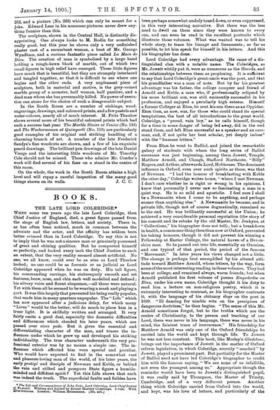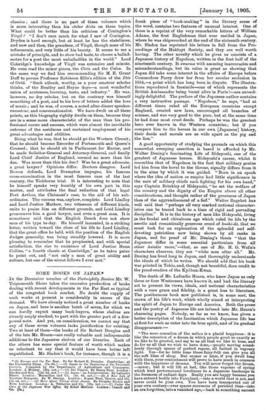WHEN some ten years ago the late Lord Coleridge, then
Chief Justice of England, died, a great figure passed from the stage of English law, letters, and society. There is, as has often been noticed, much in common between the advocate mid the actor, and the affinity has seldom been better evinced than in Lord Coleridge. To say this is not to imply that he was not a sincere man or genuinely possessed of great and shining qualities. But he comported himself so perfectly, and looked every inch the Chief Justice to such an extent, that the very reality seemed almost artificial. No one, we all know, could ever be as wise as Lord Thurlow looked; no one could be as forensic or as judicial as Lord Coleridge appeared when he was on duty. His tall figure, his commanding carriage, his statuesquely smooth and set features, brow, nose, and chin each well modelled and defined ; his silvery voice and fluent eloquence,—all these were natural. Yet with them all he seemed to be wearing a mask and playing a part. It was this largely that prevented his being really popular, that made him in many quarters unpopular. The " Life " which has now appeared after a judicious delay, for which many "Lives" would be the better, will do much to place him in a truer light. It is skilfully written and arranged. It very fairly omits a good deal, especially the domestic difficulties and differences which clouded his later years, which are passed over sicco pede. Bnt it gives the essential and differentiating character of the man, and traces the in- fluences under which he grew up and developed his striking individuality. The true character underneath the very pro- fessional exterior was by no means a simple one. The in- fluences which affected him were special and peculiar. Who would have expected to find in the somewhat ruse and pleasure-loving man of the world, of his later years, the early protégé and disciple of Newman and Keble, or behind the vain and stilted and pompous State figure a humble- minded and diffident spirit P Yet this Life shows that such was indeed the truth. The superficial faults and foibles have • The Life and Correspondence of John Duke, Lord Coleridge, Lord Chief Justice St England. Written and Edited by Ernest Hartley Coleridge. 2 vols. With Hine trations. London William Heinemann. L30s. net.]
been perhaps somewhat unduly toned down, or even suppressed, in this very interesting narrative. But there was the less need to dwell on them since they were known to every one, and can even be read in the excellent portraits which illustrate these volumes. What was wanted was to tell his whole story, to trace his lineage and lineaments ; as far as possible, to let him speak for himself in his letters. And this his biographer has done.
Lord Coleridge had every advantage. He came of a dis- tinguished clan with a notable name. The Coleridges, as Mr. Jowett wittily put it, were as numerous as the Herods, and the relationships between them as perplexing. It is sufficient to say that Lord Coleridge's great-uncle was the poet, and that his grandfather was a man of note. But by far his greatest advantage was his father, the college compeer and friend of Arnold and Keble, a man who, if professionally eclipsed by his more brilliant son, was still eminently successful in his profession, and enjoyed a peculiarly high esteem. Himself a former Colleger at Eton, be sent his son there as an Oppidan. Eton then, as now, was, for those who could stand its special temptations, the best of all introductions to the great world. Coleridge, a "proud, vain boy," as he calls himself, though for a time in some danger of being led away, did in the end stand them, and left Eton successful as a speaker and an oars- man, and, if not quite her best scholar, yet deeply imbue,' with the " humane letters."
From Eton he went to Balliol, and joined the remarkable galaxy of students with whom the long series of Balliol successes was just beginning, among them Jowett, Temple, Matthew Arnold, and Clough, Stafford Northcote, "Billy" Rogers, and Arthur, afterwards Lord, Hobhouse. The dominant influence in Oxford, even over such spirits as these, was that of Newman. "I had the honour of breakfasting with Keble the other day," Coleridge writes home, " where I met Newman. I don't care whether he is right or wrong in his opinions, I know that personally I never saw so fascinating a man in a quiet way. He is so mild and apostolic. I feel sure I shall be a Newmanite when I come to be anything, and perhaps sooner than anything else." A Newmanite he became, and in private life, though not of course dogmatically, remained so to the end. He was brilliantly successful at the Union ; he achieved a very considerable personal reputation (the story of his conceit and its rebuke by the old Master, Dr. Jenkyns, at " Collections," his biographer does not tell) ; but a breakdown in health, a commoner thing then than now at Oxford, prevented his taking honours, though it did not prevent his winning a Fellowship at Exeter College, the natural haven of a Devon- shire man. So he passed out into life, essentially an Oxonian, and one typical of that period, the period of the famous " Movement." In later years his views changed not a little. The change is perhaps best exemplified by his altered atti- tude toward Matthew Arnold, whose letters, by the way, form some of the most interesting reading in these volumes. They had been at college, and remained always, warm friends; but when Arnold published his first volume of poems Empedocles on Etna, under his own name, Coleridge thought it his duty to read him a lecture on non-religious poetry, which it is extremely interesting to contrast, as his biographer contrasts it, with the language of his obituary eloge on the poet in 1889. " Ill dancing for nimble wits on the precipices of dangerous doctrines," he then begins. " The sense of this Mr. Arnold sometimes forgot, but to the truths which are the centre of Christianity, to the person and teaching of our Lord, there was never in his language, there was never in his mind, the faintest trace of irreverence." His friendship for Matthew Arnold was only one of the Oxford friendships he carried into the world and kept through life. To Jowett he was not less constant. This book, like Morley's Gladstone, brings out the importance of Jowett in the matter of Oxford reform legislation, in which Coleridge, secretly " coached " by Jowett, played a prominent part. But partiality for the Master of Balliol need not have led Coleridge's biographer to credit him with the famous saying, " We are none of us infallible, not even the youngest among us." Appropriate though the reminder would have been to Jowett's distinguished pupil, it was really said by Thompson, the Master of Trinity, Cambridge, and of a very different person. Another thing which Coleridge carried from Oxford into the world, and kept, was his love of letters, and particularly of the classics ; and there is no part of these volumes which is more interesting than his obiter dicta on these topics. What could be better than his criticism of Conington's Virgil ? "I don't care much for what I saw of Conington. Dryden is hard enough, but at least he has the stateliness, and now and then, the grandeur, of Virgil, though none of his refinements, and very little of his beauty. It seems to me a mistake of principle, and to show bad taste, to choose a ballad- metre for a poet the most unballadlike in the world." Lord Coleridge's knowledge of Virgil was extensive and minute. He even read the minor pieces, the Girls and the Cules. In the same way we find him recommending Sir M. E. Grant Duff to peruse Professor Robinson Ellis's edition of the Ibis of Ovid. "Such albook, worthy, as a poor amateur scholar thinks, of the Bentley and Heyne days—a most wonderful union of acuteness, learning, taste, and industry." He was, however, no dry scholar, but on the contrary was himself something of a poet, and to his love of letters added the love of music ; and he was, of course, a noted after-dinner speaker, raconteur, and conversationalist. We have dwelt on all these points, as this biography rightly dwells on them, because they are in a sense more characteristic of the man than his pro- fessional career and success, which were almost the inevitable outcome of the assiduous and sustained employment of his great advantages and abilities.
Being what he was, that he should go the Western Circuit; that he should become Recorder of Portsmouth and Queen's Counsel ; that he should sit in Parliament for Exeter, and be made Solicitor-General and Attorney-General, and finally Lord Chief Justice of England, seemed no more than his due. Was more than this his due P Was he a great advocate, a great lawyer P Opinions differ. Doctors disagree. Lord Bowen defends, Lord Brampton impugns, his famous cross-examination in the moat famous case of the last century, the Tichborne trial. It is interesting to note that he himself speaks very humbly of his own part in this matter, and attributes the final reduction of that legal Port Arthur, the Claimant's case, to the aid of his sub- ordinates. The success was, anyhow, complete. Lord Lindley and Lord Justice Mathew, two witnesses of different kinds, unite to praise him on different grounds, and Lord Lindley pronounces him a good lawyer, and even a great man. It is sometimes said that the English Bench does not show men of his type to-day. He himself lamented, in a striking letter, written toward the close of his life to Lord Lindley, that the great office he held, with the position of the English Judges generally, was being steadily lowered. It is more pleasing to remember that he prophesied, and with special satisfaction, the rise to eminence of Lord Justice Heim Collins, " a fourth classic at Cambridge," as he takes pains to point out, and " not only a man of great ability and culture, but one of the nicest fellows I ever met."
SOME BOOKS ON JAPAN.*







































 Previous page
Previous page